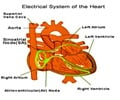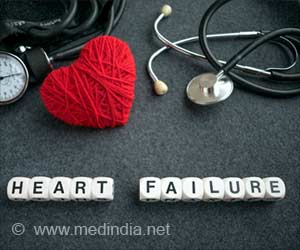A procedure that sends targeted energy into the heart through a catheter can be used to treat a common type of irregular heartbeat.
A procedure that sends targeted energy into the heart through a catheter can be used to treat a common type of irregular heartbeat, but little is known about the treatment's long-term benefits and the best methods and circumstances for applying it, according to a new report funded by Department of Health & Human Service’s (HHS) Agency for Healthcare Research and Quality (AHRQ).
The report examines the use of a procedure called radiofrequency catheter ablation to treat a type of irregular heartbeat known as atrial fibrillation. The new comparative effectiveness report found that the procedure has been shown to provide benefits in maintaining normal heart rhythm over short periods of time (up to 1 year) but found little evidence indicating whether the procedure reduces the chance that patients will experience atrial fibrillation over the long term.The report, which compared radiofrequency catheter ablation to medication-based therapy, also found that the effect of the procedure on stroke, a major risk for patients with atrial fibrillation, is unknown. Radiofrequency catheter ablation-a procedure in which a long, thin, flexible tube is put through a blood vessel into the heart-often is used when medications do not work. In this procedure, energy pulses are delivered through the catheter to the heart, destroying small areas of heart tissue where abnormal electrical signals may cause an arrhythmia to start.
Different techniques and instruments can be used for the procedure. While there is no strong evidence to suggest that one particular technique is best for any given patient, there is general consensus concerning a basic approach to ablation procedures for atrial fibrillation. In addition, there is little evidence indicating the procedure's effectiveness when used as a first-line therapy instead of medication.
"Radiofrequency holds promise for treating atrial fibrillation, but it is clear that more research is needed to demonstrate its potential long-term benefits," said AHRQ Director Carolyn M. Clancy, M.D. "This report crystallizes the questions that researchers need to ask going forward."
Atrial fibrillation, the most common type of irregular heartbeat in adults, affects more than 2.2 million Americans, putting them at risk for heart failure, blood clots, or stroke. Patients with atrialfibrillation are typically treated with medication first, but medicines only work for about half of patients for preventing recurrence of atrial fibrillation.
The report calls for more research on the effect of radiofrequency catheter ablation on quality of life. In particular, more research is needed for groups of patients for whom the research is especially lacking, such as women, the elderly, and patients who have other conditions such as heart failure or high blood pressure.
Advertisement
As a condition of catheter approvals, the FDA mandated that the catheters' manufacturer must conduct two post approval studies (PAS) to collect long term safety data. The mandated studies apply only to FDA-approved catheters, and not to devices used off-label in clinical practice.
Advertisement
The second PAS is a subgroup analysis from an ongoing larger study that will look at the incidence of stroke, and compare the 3-year incidence of stroke between patients treated with the approved ablation catheters versus patients treated with medication. This study will analyze total mortality, serious bleeding and cardiac arrest.
Source-Newswise
LIN









